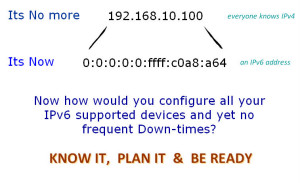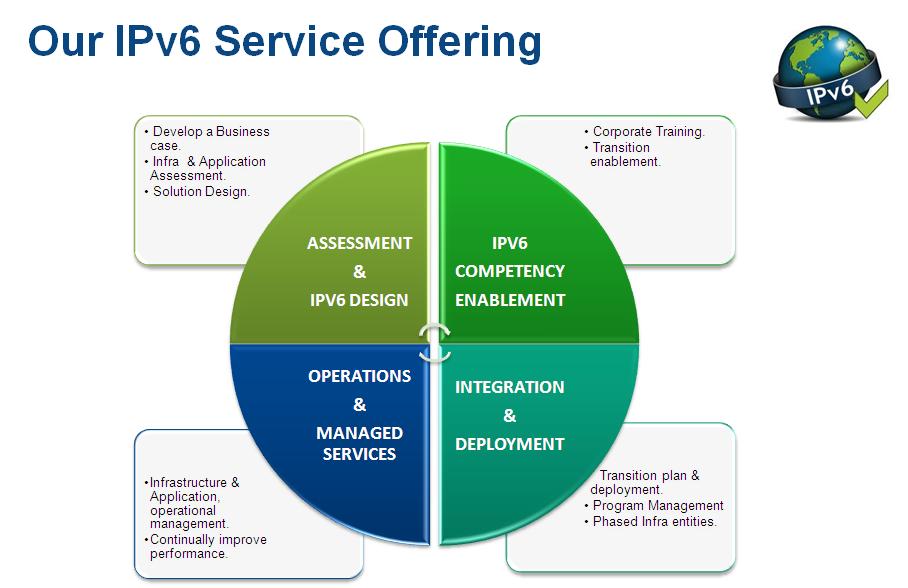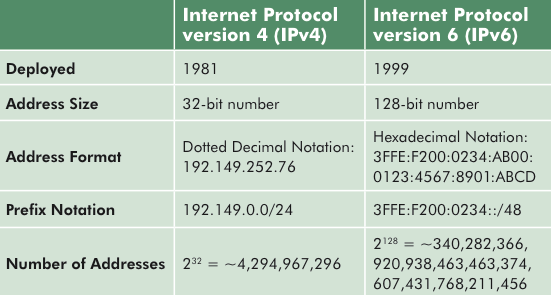IPv6 Transition Services

IPv6
tr@ceDATA offers Consulting services to help you understand this new version of Internet Protocol (IPv6). What needs to be done, when, and in what order.
Our Services encompass the complete life cycle of the IPv4 to IPv6 transition for enterprises.

Our consulting allows organizations to choose the method and pace of internal migration to IPv6 that best suits their needs, and will allow access to their network via either IPv4 or IPv6.
The IPv4 to IPv6 Transition framework
- Provisioning the lengthy 128-bit IPv6 addresses, both from internal IPv6 devices and from outside IPv6 devices trying to access the network.
- Accommodating both IPv6 and IPv4 systems in a dual-stack solution, if desired.
- Continuing to communicate and connect with others during their cutover process.
- Devising and implementing an internal migration to IPv6 at a pace and time chosen by the organization including a department-by-department conversion and testing plan.
- Identifying network components that need to be updated, upgraded, or replaced in order to be IPv6-compliant.
Our Services on IPv6
– IPv6 Essentials Training for Corporate Executives.
– IPv4 to IPv6 Transition Consultation.
– IPv4 to Ipv6 Migration Services.
– IPv6 Network Maintenance.
Our IPv6 Services is suitable for multi-vendor Enterprise IT infrastructure platforms which comprise Microsoft, HP, Dell, VMware, IBM, Cisco, Juniper, Linux, Unix & other appliances.
Contact us now to understand your transition plan, email us at info@tracedata.in
Some facts about IPv6
Should we even care about IPv6 ? Now ?
IPv6 is the future of the Internet, and without it we can no longer grow.We have been growing the commercial Internet for decades using the IPv4 address space. At the time of its creation, IPv4 was not intended to satisfy the needs of a global commercial Internet. It was intended to support the needs of experimental research and government networks. We have known all along IPv4 was a limited resource and that one day it would fully deplete. That day has come. For some geographic regions there is no remaining IPv4 address space to be distributed for general purpose use. Very soon, IPv4 will be fully depleted around the globe.
The Number Resource Organization has more information about the depletion of the IPv4 resource.
For us to move forward and continue adding new devices and services to the Internet, we must deploy IPv6. It was designed with the needs of a global commercial Internet in mind, and deploying it is the only way we can continue forward with an open and innovative Internet.
Do i need to switch to IPv6 now ?
Organizations who don’t “plan and be ready” with required investments, infrastructure & resources will have to switch to IPv6 when they actually have to and in a short time, due to last minute business requirements. A straightforward switchover can’t happen because IPv4 and IPv6 aren’t compatible protocols. Dual network stacks that support both protocols will be necessary for the foreseeable future.
My ISP, devices and OS already support IPv6. so Why bother ?
IPv4 & IPv6 are not compatible, hence IPv4 networks cannot access IPv6 Servers and vice-verse. Hence your Infrastructure need to support both (Dual Stack).
Configuring each of your devices & IT entities needs immense planning and assessment of design before deployment. Of course this essentially involves all IT entities including the Application Servers and the resources they render. Enabling just the devices may not really help as you would need to plan the DHCP, VLAN, VPN, Wireless, Project based Application Server access, Public Servers etc.. and configure them for a dual stack… and still it should work..
Comparison

IPv4 Vs IPv6
An IPv6 IP address example.

IPv6 address format
Benefits of IPv6
- The inevitable future over limitations of IPv4.
- More efficient address space allocation.
- End-to-End addressing. No more NAT.
- Fragmentation only by the source host.
- Routers do not calculate header checksum. Speedy networks.
- Multicasting instead of Broadcasting. Certain applications run faster.
- Built-in Security mechanisms.
- Single Control Protocol (ICMPv6).
- Auto Configuration.
- Modular header structure.
Contact us for any queries on IPv6 and we will have our experts revert to you.
Back to IPv6 Practice or IPv6 Training & Certification
